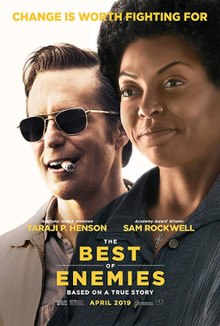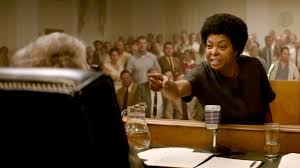Difference between revisions of "The Best of Enemies"
| Line 1: | Line 1: | ||
[[File:The Best of Enemies.jpg|thumb|The Best of Enemies Movie Cover]] | [[File:The Best of Enemies.jpg|thumb|The Best of Enemies Movie Cover]] | ||
| − | The Best of Enemies is a | + | The Best of Enemies is a movie adaptation from The Best of Enemies: Race and Redemption in the New South by [https://en.wikipedia.org/wiki/Osha_Gray_Davidson Osha Gray Davidson] and published in 2019. This movie is directed and written by Robin Bissell, starring Taraji P. Henson, Sam Rockwell, Babou Ceesay, Anne Heche, Wes Bentley, Bruce McGill, John Gallagher Jr., and Nick Searcy. <ref>[https://en.wikipedia.org/wiki/The_Best_of_Enemies_(2019_film) The Best of Enemies]. Wikipedia. Retrieved January 19 2021.</ref> |
== Plot == | == Plot == | ||
| − | The | + | The genuine story of the impossible connection between Ann Atwater, a blunt civil rights activist, and C.P. Ellis, a local Ku Klux Klan leader. During the racially charged summer of 1971, Atwater and Ellis meet up to co-chair a community summit on the desegregation of schools in Durham, N.C. The following discussion and fight before long lead to amazing disclosures that change both of their lives for eternity.<Ref>[https://www.rottentomatoes.com/m/the_best_of_enemies_2019 The Best of Enemies]. Rotten Tomatoes. Retrieved January 19 2021.</ref> |
== Controversy == | == Controversy == | ||
[[File:The Best of Enemies 2.jpg|thumb|left|The Best of Enemies Movie Scene]] | [[File:The Best of Enemies 2.jpg|thumb|left|The Best of Enemies Movie Scene]] | ||
| − | C.P. Ellis, a local Ku Klux Klan leader who | + | C.P. Ellis, a local Ku Klux Klan leader who hesitantly co-led a local area summit over the desegregation of schools in Durham, North Carolina during a racially-charged summer in 1971, shown discrimination towards black people many times in the movies. In the movie, he is shown to lead his Klan Subordinates in shooting up a house of a white woman, when the woman is still in the house because he finds out that she's dating a "nigger." The Ku Klux Klan Leader won't sit with black people, there is a scene that shows that he tries to avoid occupying any space close to Atwater by sulking about the room, he also stares at everything but her, while Atwater's frowned face follows all his steps. As the owner of a gas station, he won’t give any service to black people. Also, he doesn’t hesitate to call them “niggers” (or the more cartoonish “nigras”) while they are there. What's more, he absolutely will not approve of having his kids go to the same schools as the black kids. <ref>Obenson, Tambay. [https://www.indiewire.com/2019/04/the-best-of-enemies-taraji-p-henson-sam-rockwell-racism-1202056673/ 'The Best of Enemies’ Is Latest Proof Hollywood Needs a Better Approach to Stories About the Civil Rights Era]. IndieWire. 10 April 2019. Retrieved January 19 2021.</ref> |
== Pros == | == Pros == | ||
| − | This movie shows that C.P. has grown up | + | This movie shows that C.P. has grown up seeing black people as The Other. As he invests increasingly more energy in a room, chatting with them on equivalent balance, his obliviousness begins to fall away, regardless of his earnest attempts to hold it set up. <ref>Gleiberman, Owen. [https://variety.com/2019/film/reviews/the-best-of-enemies-review-taraji-p-henson-sam-rockwell-1203179322/ Film Review: ‘The Best of Enemies'] Variety. 4 April 2019. Retrieved January 19 2021.</ref> |
| − | During the | + | During the democratic scene, all the issues pass, coming down to the last issue of desegregation. One by one, the voters' vote. Ann votes for it, and C.P., surprisingly, does the same, understanding the KKK is contemptuous. Also, he gives a speech and tears up his KKK membership card, much to the wrath of his watching KKK friends. They threaten him and attempt to set the gas station that he owns on fire but C.P. puts it out. Because of that, the white community won't buy his gas anymore and his gas station is going out of business. Then, Ann and Bill visit him with smiles and bring the black community to buy from him. <ref>[https://en.wikipedia.org/wiki/The_Best_of_Enemies_(2019_film)#Critical_response The Best of Enemies]. Wikipedia. Retrieved January 19 2021.</ref> |
Revision as of 07:13, 5 March 2021
The Best of Enemies is a movie adaptation from The Best of Enemies: Race and Redemption in the New South by Osha Gray Davidson and published in 2019. This movie is directed and written by Robin Bissell, starring Taraji P. Henson, Sam Rockwell, Babou Ceesay, Anne Heche, Wes Bentley, Bruce McGill, John Gallagher Jr., and Nick Searcy. [1]
Contents
Plot
The genuine story of the impossible connection between Ann Atwater, a blunt civil rights activist, and C.P. Ellis, a local Ku Klux Klan leader. During the racially charged summer of 1971, Atwater and Ellis meet up to co-chair a community summit on the desegregation of schools in Durham, N.C. The following discussion and fight before long lead to amazing disclosures that change both of their lives for eternity.[2]
Controversy
C.P. Ellis, a local Ku Klux Klan leader who hesitantly co-led a local area summit over the desegregation of schools in Durham, North Carolina during a racially-charged summer in 1971, shown discrimination towards black people many times in the movies. In the movie, he is shown to lead his Klan Subordinates in shooting up a house of a white woman, when the woman is still in the house because he finds out that she's dating a "nigger." The Ku Klux Klan Leader won't sit with black people, there is a scene that shows that he tries to avoid occupying any space close to Atwater by sulking about the room, he also stares at everything but her, while Atwater's frowned face follows all his steps. As the owner of a gas station, he won’t give any service to black people. Also, he doesn’t hesitate to call them “niggers” (or the more cartoonish “nigras”) while they are there. What's more, he absolutely will not approve of having his kids go to the same schools as the black kids. [3]
Pros
This movie shows that C.P. has grown up seeing black people as The Other. As he invests increasingly more energy in a room, chatting with them on equivalent balance, his obliviousness begins to fall away, regardless of his earnest attempts to hold it set up. [4] During the democratic scene, all the issues pass, coming down to the last issue of desegregation. One by one, the voters' vote. Ann votes for it, and C.P., surprisingly, does the same, understanding the KKK is contemptuous. Also, he gives a speech and tears up his KKK membership card, much to the wrath of his watching KKK friends. They threaten him and attempt to set the gas station that he owns on fire but C.P. puts it out. Because of that, the white community won't buy his gas anymore and his gas station is going out of business. Then, Ann and Bill visit him with smiles and bring the black community to buy from him. [5]
References
- ↑ The Best of Enemies. Wikipedia. Retrieved January 19 2021.
- ↑ The Best of Enemies. Rotten Tomatoes. Retrieved January 19 2021.
- ↑ Obenson, Tambay. 'The Best of Enemies’ Is Latest Proof Hollywood Needs a Better Approach to Stories About the Civil Rights Era. IndieWire. 10 April 2019. Retrieved January 19 2021.
- ↑ Gleiberman, Owen. Film Review: ‘The Best of Enemies' Variety. 4 April 2019. Retrieved January 19 2021.
- ↑ The Best of Enemies. Wikipedia. Retrieved January 19 2021.

